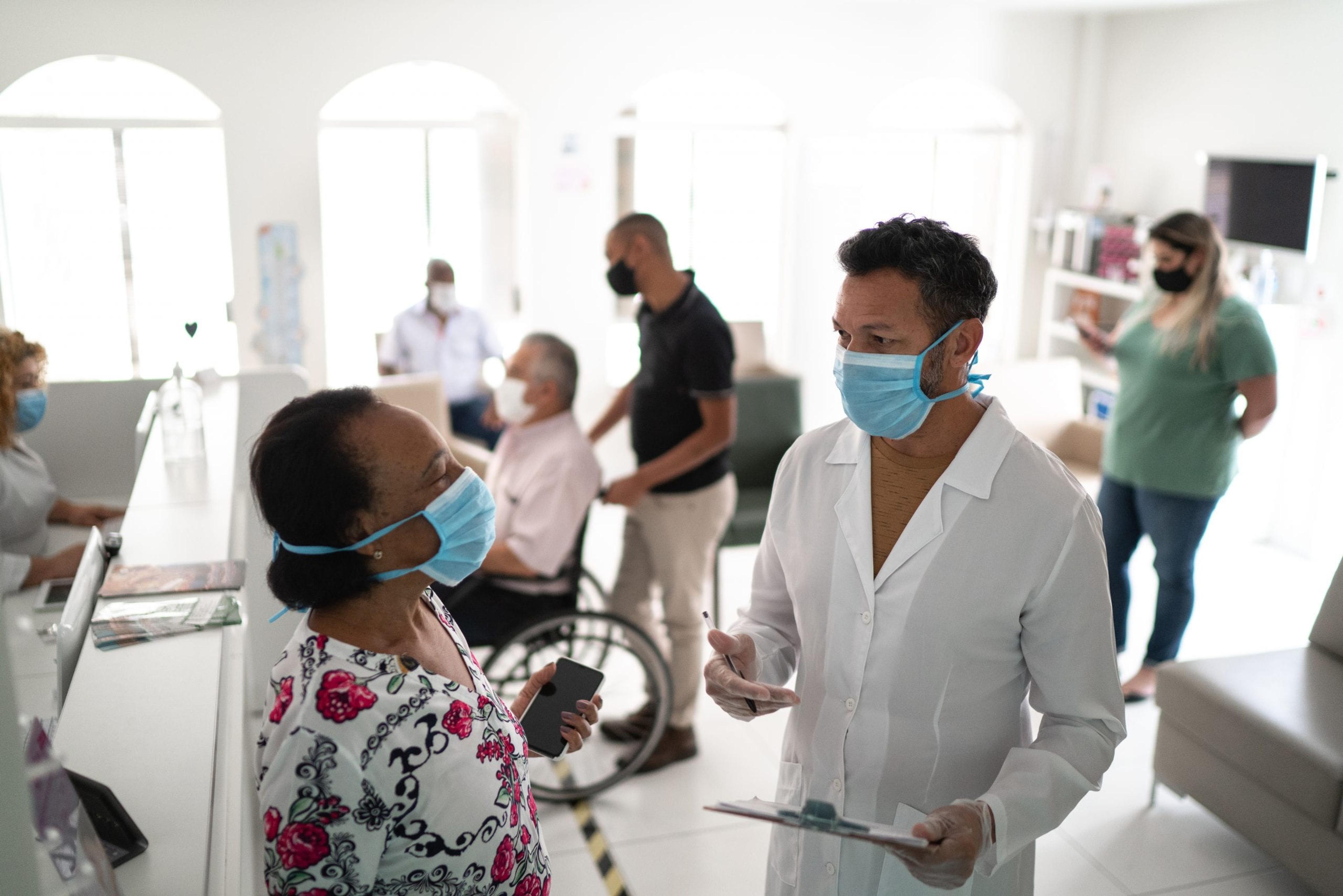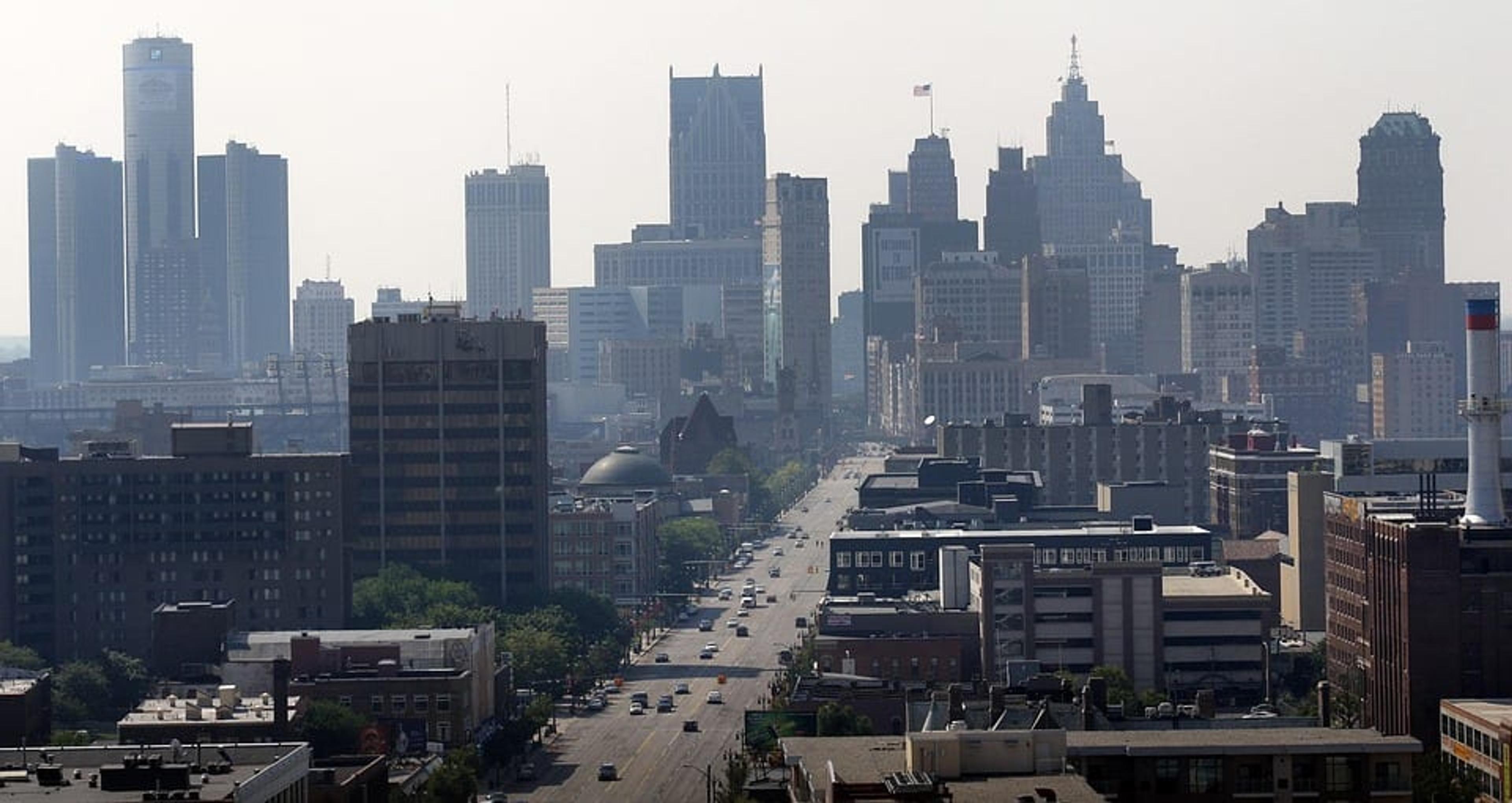Improving Access to Care in Michigan
Julie Bitely
| 6 min read

Dr. Farhan Bhatti with a patient prior to the COVID-19 pandemic. At Care Free Medical Clinic in Lansing, CEO and medical director Dr. Farhan Bhatti treats patients who have often gone without medical or behavioral health care, putting it off for a variety of reasons. “Many of these people went their entire adult lives without access to health care,” he said. By the time patients do seek treatment, manageable conditions such as diabetes have gone unaddressed for so long that sometimes serious complications have developed. “We’re sort of trying to make up for lost time with a lot of our folks,” Bhatti said. Of the 6,000 patients served at Care Free every year, almost all are considered low-income, Bhatti said. About 10% are completely uninsured while another 10% have insurance but can’t afford costs associated with their high-deductible plans. The rest of the center’s clients have Medicaid or Medicare.
FACTORS THAT IMPACT ACCESS TO HEALTH CARE
Access to health care is considered a social determinant of health. The ability to access health services is linked to multiple social, economic and environmental circumstances, including race, ethnicity, socioeconomic status, age, sex, disability status, sexual orientation, gender identity, education, geographic location and cultural factors. Being uninsured or underinsured plays a big role in access to health care. In 2019, about 10.3% of adults in the United States were uninsured, according to the Centers for Disease Control and Prevention. That number rose to 14.7% looking at just adults ages 18 to 64. States with expanded Medicaid programs, such as Michigan with its Healthy Michigan Plan, tend to have lower rates of uninsured individuals. The Healthy Michigan Plan now covers more than 900,000 Michiganders, a number that rose dramatically during the COVID-19 pandemic. In March 2020, only about 680,000 residents were enrolled in the plan. Not having health insurance means you’re less likely to have a primary care provider, which means you’re also less likely to get routine screenings that could catch things like cancer earlier. You’re also less likely to be able to access medications you might need. Transportation is another barrier that can make it difficult to access care. Without a reliable way to get to appointments, you’re more likely to delay care or need to reschedule. It’s also likely harder to access necessary medications and it could be more difficult to manage complex health needs which might require frequent appointments in different locations. Living in a location with a shortage of health care providers can also act as a barrier to health care. For example, northern Michigan residents face an acute shortage of psychiatrists. In parts of the northern Lower Peninsula and in the U.P., there are counties with no psychiatrists at all, according to a study by Altarum. And, even if you live in an area with lots of providers, many may not accept Medicaid due to lower reimbursement rates, compounding the impact on people with low incomes. Disparities exist when it comes to access to care. According to CDC data, Black and Hispanic individuals face higher rates of being uninsured. People experiencing poverty also face higher barriers when it comes to accessing care. Additionally, finding culturally competent care can also discourage people from seeking care they need. For example, a transgender individual might put off care if their provider consistently uses the wrong pronoun. Bhatti said many of his patients with sickle cell disease, which predominantly affects African American patients and can be quite painful when symptoms present, have faced discrimination when they’ve gone to the emergency room. He said they’re often assumed to be seeking pain medications for reasons unrelated to the disease. “Every sickle cell patient I have hates going to the hospital,” he said. “If they don’t have a relationship, they’re pre-judged as it relates to their pain. They can go and deal with the humiliation of being discriminated against or stay home.”
WHAT BLUE CROSS IS DOING TO IMPROVE ACCESS TO CARE
At Blue Cross, we’re focused on improving health care for everyone in Michigan, regardless of the name on their insurance card. By improving access to care, more people will be able to manage chronic medical and mental health conditions, leading fuller and healthier lives. More access to preventive care will also catch health conditions earlier, which saves lives and reduces the overall cost of health care by avoiding costlier interventions and preventable hospitalizations. These are just a few examples of how we’re tackling access to health care as an organization:
- Since 2005, Blue Cross Blue Shield of Michigan’s Strengthening the Safety Net program has invested more than $16 million in grants to clinics providing free or low-cost health care for uninsured and vulnerable Michigan residents. Care Free has been a recipient of Safety Net funding. Applications for the next round of grants is open now through Friday, June 4.
- To address barriers related to implicit bias, Blue Cross is leveraging its strong provider relationships to create awareness of the issue and tying incentives to provider organizations’ completing cultural competency training related to race, ethnicity, gender, sexual orientation, obesity or socioeconomic status.
- To ensure easier access to care for seniors, Blue Cross is partnering with Dedicated Senior Medical Centers, a subsidiary of ChenMed, to open six new primary care centers in Wayne County with an emphasis on serving low- and moderate-income seniors.
ACCESS TO HEALTH CARE CAN CHANGE LIVES
Back at Care Free, once Bhatti’s patients are able to receive regular care after years without, the effects are often life-changing. He’s seen people with chronic depression unable to hold down a job transform with the right treatment and medication. “You get them the help they need and they feel better for the first time in decades,” he said. Patients who seek treatment or preventive services at Care Free are treated with dignity and respect. “The quality of care here is just like the quality of care they would receive elsewhere, or better,” Bhatti said. “We are just of the belief that we can help people advance and grow in their lives by helping them attain good health and wellness.” Editor’s Note: This is one story in part of a year-long blog series. Blue Cross Blue Shield of Michigan journalists will be diving into some of the environmental and socio-economic reasons behind disparate health outcomes for certain groups of people. While there is no one answer or simple solution to resolving these complex issues, we’ll talk to community organizations working to address social determinants of health in neighborhoods and communities across Michigan, as well as highlight work that Blue Cross is doing to contribute to solutions for the health of all Michiganders. Related:
- Understanding Social Determinants of Health in Michigan
- How Poverty Contributes to Poor Health
- The Link Between Education and Health Outcomes
Main image photo credit: Getty Images





